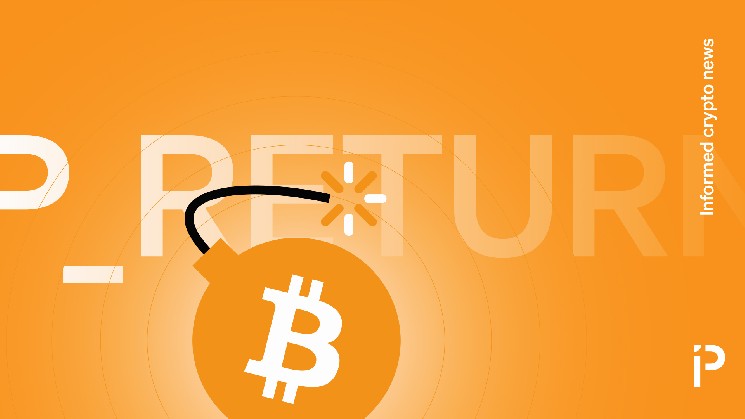
A Bitcoin fork proposed this weekend would commence an activation period for updating consensus rules to limit data storage unrelated to the on-chain movement of BTC In a dramatic escalation of this year’s OP_RETURN war, pseudonymous dev “Dathon Ohm” revived Bitcoin Improvement Proposal (BIP) 2017, also called “Reduced Data Temporary Softfork,” that might become BIP 444 if someone codes an activation client and formalizes it on GitHub. The new blockchain would refuse many types of common data storage for media, collectibles, roll-ups, and other novelty or business uses at its base, consensus level. Specifically, the proposal escalates disagreement over Bitcoin Core v30’s relaxed approach to queuing up to 100KB of arbitrary data per transaction in nodes’ memory pools (“mempools”). It would make such contiguous chunks of data incompatible with the blockchain’s rules for valid transactions — not just mempools’ default standardness rules. For context, Bitcoin Core is the most popular software for Bitcoin full node operators with thousands of operators online at any moment. OP_RETURN is the most common Bitcoin scripting code to place data into transactions that is unrelated to validating the movement of bitcoin (BTC). Version 29 (v29) and prior of Bitcoin Core disallowed multiple OP_RETURN outputs per transaction, as well as OP_RETURN outputs exceeding 84 bytes, in its default mempool. Core v30, in contrast, accepts and relays multiple OP_RETURN outputs, as well as OP_RETURN outputs of up to 100KB, across its default mempool. Bitcoin Core developers released v30 on October 10. A Bitcoin hard fork creates a backward-incompatible blockchain requiring all nodes to upgrade, whereas a soft fork is backward-compatible that allows older nodes to validate transaction validity on the same blockchain. Two activation proposals for a Bitcoin soft fork Flagging the growing popularity of Core v30 to the Bitcoin-Dev mailing list, Dathon Ohm has proposed a dual activation method for a soft fork that would, if successful, permanently end many types of on-chain data storage such as inscriptions, runes, ordinals, and roll-ups. Interestingly, as proposed, it would not end Stamps — a more difficult-to-censor type of protocol that hacks data onto the blockchain in a way that is difficult to prevent at the consensus level. Dathon Ohm calls the two activation methods “proactive” and “reactive.” In essence, the proactive proposal has a placeholder block height of 987424 — likely January 2027 based on average mining times — for an orderly “flag day” when people supporting the reduction of on-chain data storage would update their consensus rules. The reactive method, in contrast, would activate randomly at any time over the next 15 months whenever miners notice illegal content such as CSAM and refuse to include those transactions in Bitcoin’s blockchain. “In this case, the new rules are effective on the very next block,” wrote Dathon Ohm. Although both activation methods are alarming, the reactive method earned the most criticism for its near-term impact. Already alleging that its proponents are planning to use lawfare and send threatening legal letters to miners to pressure them into running this reactionary fork, this contentious activation method is earning the most attention on social media. Read more: Three sneaky changes in Bitcoin Core v30 are confusing node operators Blaming Luke Dashjr and Bitcoin Mechanic Many people are blaming Core developer Luke Dashjr and his OCEAN mining pool colleague, Bitcoin Mechanic, for Dathon Ohm’s proposal. TheRage previously reported that Dashjr was planning for a hard fork. He responded by calling the article “completely unfounded lies.” Over the weekend, many developers including Dashjr were gathering at Plan B, a Tether-sponsored Bitcoin conference in Switzerland. Dashjr, in addition to tasks like pull request reviews and assigning BIP numbers, advocates for Knots, a forked version of Bitcoin Core that refuses to increase the OP_RETURN data storage allowances of Core v30. Some people believed that the in-person meeting provided an opportunity for the Knots community to propose this soft fork.
Saylor's Strategy the First Bitcoin Treasury Company Rated by Major Credit Agency
1 hour ago
ICP Faces Downward Pressure but Traders Eye Relief Bounce Near $3.15
1 hour ago
BONK Battles Back After Breaking Support; Traders Eye $0.000015 Rebound
1 hour ago
South Korean Crypto Exchanges See 1,400x Jump in Flows Linked to Sanctioned Cambodian Entities
1 hour ago
Trump's American Bitcoin and Saylor's Strategy Add to Bitcoin Holdings
1 hour ago
Crypto Stocks Climb Alongside Bitcoin and Nasdaq on Chinese Trade Talk Optimism
1 hour ago